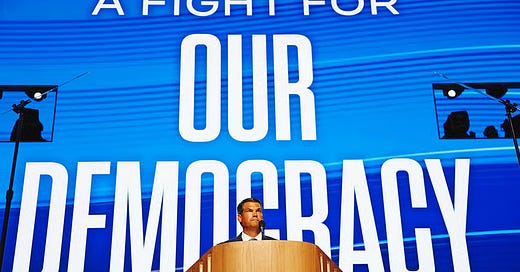Why They Treat Mamdani Like Trump
Why the defenders of “democracy” panic when it actually works.
When Zohran Mamdani won the New York City Democratic mayoral primary, the political establishment didn’t treat it as a moment of democratic renewal. They treated it like a crisis.
Not because Mamdani is dangerous in the way Donald Trump is. He isn’t. But because both represent something the liberal establishment fears more than extremism: a disruption to their control. And when that control is threatened, the response is always the same—frame it, isolate it, and contain it.
In the days following Mamdani’s win, messaging shops and pundit outlets scrambled to recast his campaign not as a legitimate democratic breakthrough, but as a messaging problem. Lincoln Square Media published a piece urging Democrats not to “overread” the victory, warning against any serious engagement with its meaning. The Bulwark’s headline asked, “What Zohran Mamdani Can Teach Democratic Centrists?”—then opened with a line about how “moderate Democrats were left panicky.” That panic becomes the premise. What follows is a performance of concern, not curiosity.
But the deeper story here isn’t just about Mamdani or Trump. It’s about the ideology that governs how the liberal professional class understands politics. These figures—consultants, editorial boards, Substack influencers, and technocratic strategists—present themselves as guardians of democracy. But what they’re actually defending is a very narrow, fragile consensus. One where capitalism, liberalism, and democracy are treated as interchangeable—and where any serious disruption, whether from the left or the right, must be reduced to narrative risk.
Mamdani didn’t just win a race. He challenged the frame. His campaign focused on working-class issues—fare-free transit, rent freezes, public ownership, and care infrastructure. He named the economic and social conditions that have made life intolerable for so many. He didn’t flatter the system; he rejected its premises. That’s what made him dangerous. And that’s why the response from the professional center wasn’t engagement—it was containment.
We’ve seen this play before. With Trump, the liberal establishment first laughed, then panicked, then built an entire media apparatus to explain him away. Not as a product of structural failure, but as a one-time aberration—a freak accident. An external threat, not an internal reckoning. The goal wasn’t to fix what made him possible. The goal was to restore faith in the system that failed in the first place.
The same thing is happening with Mamdani, but subtler. Trump was denounced as authoritarian. Mamdani is treated as naïve, unserious, or a liability. But both are positioned outside the boundaries of “responsible” politics. Both are denied the dignity of being taken seriously. Because to take them seriously would require reckoning with the failures of the political class itself.
That class—especially the slice that markets itself as “pro-democracy”—functions more like a priesthood than a deliberative body. Their version of democracy isn’t about power flowing upward. It’s about process, ritual, and symbolism. It’s not participatory—it’s managerial. And when that ritual is broken, the response isn’t to reimagine democracy. It’s to shut down the conversation.
In this view, democracy is something you preserve through polling averages, donor appeals, and expert panels—not something you remake through solidarity or struggle. But if your version of democracy only functions when the right people win, is it democracy—or just a legitimacy machine in crisis?
That’s what Mamdani’s win exposes. Not radicalism, but a crack in the façade. A reminder that politics is still capable of meaning something—that it can still be an instrument of material change, not just symbolic affiliation.
And that’s why the consultant class is rushing to downplay him. Not because they’re scared of losing an election. But because they’re scared of losing control over the narrative that keeps them in power.
If you want to see ideology at work, look at how people respond to disruption. The technocratic center doesn’t engage with it. It pathologizes it. Trump becomes a monster. Mamdani becomes a fluke. And democracy becomes something to be protected from the people, not returned to them.
That’s the tell. That’s the panic. And that’s why Zohran Mamdani matters—because he reminds us that democracy isn’t just a brand. It’s a fight over who gets to decide what the future looks like.
And they’re not ready to give that up.
P.S.
Watch how liberal pundits, think tank fellows, and messaging firms respond over the next few weeks. If Mamdani’s win is discussed as a “messaging challenge,” a “branding issue,” or a “democratic risk,” that’s not analysis—it’s ideology. You’re watching a class try to regain control of a story that no longer belongs to them. That in itself is a victory for the left, as I wrote about with David Sirota in The Lever the night of Mamdani’s win. You can read that here.





"Why the defenders of “democracy” panic when it actually works."
Jacobo Árbenz first came to my mind there, Evelyn...
All top solidarity wishes! 😃🏴☠️